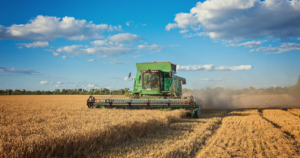
The Ukrainian agricultural sector is faced with the need to implement EU standards, which could cost the industry up to €2.5 billion annually, but at the same time opens up strategic opportunities for integration and strengthening Ukraine’s role in global food security, said Andriy Dykun, chairman of the All-Ukrainian Agrarian Council (AUC).
“Calculations show that the introduction of European eco-standards will cost the Ukrainian agricultural sector approximately €2.5 billion per year, which amounts to €70-150 in additional costs per hectare. We must incorporate these standards into our legislation. And at the same time, no one is even talking about giving Ukraine subsidies,“ the association’s press service quoted him as saying at the conference ”Agribusiness in Ukraine.”
He added that environmental standards are currently under pressure in Europe itself.
“It is important to understand that these standards are not yet a certainty in the EU itself. European farmers are also under a lot of pressure, and their green course is constantly changing,” Dykun noted.
After unification, Ukraine and Europe together will be the largest food producer in the world.
“We are the only country that will join the EU with agriculture better than in any other EU country — we are coming in with a high level. But we must unite with Europe not with an “outstretched hand,” but as an equal partner, which together with the EU will become the world’s largest food producer. This needs to be worked out professionally,” the VAS chairman concluded.
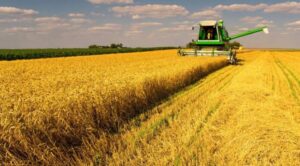
Let’s track the prices as of the end of June 2025 for the main grain and oil crops exported from Ukraine, as well as fluctuations in their value on the world market.
The price of wheat (France, FOB) was 235 USD/t, according to market operators on June 25, 2025. This is 1 USD less than last week, 6 USD more than the previous month, and 3 USD more than the previous year. The price of wheat (Ukraine, 2nd grade, CPT) for the central regions (June 26) was 192 USD/t. This figure remained unchanged during the week, decreased by 15 USD over the month, and increased by 45 USD over the year. For ports, the amount was 206 USD/t, which is 3 USD less than a week ago and 18 USD less than a month ago, but 19 USD more than a year ago.
According to the International Grains Council, the price of corn (USA, FOB) as of June 25 was 192 USD/t. This is USD 8 less per week and USD 16 less per month, but USD 3 more per year. The price of corn (Ukraine, CPT) on June 26 for the central regions was USD 204/t. It did not change during the week, but decreased by USD 4 per month and increased by USD 73 per year. For ports, it was 216 USD/t (also unchanged from the previous week, down 16 USD from the previous month, and up 3 USD from 2024).
“Let’s pay attention to the forecast for global corn production in 2025/26 MY. It has been reduced by 1 million tons to 1,276 million tons, compared to 1,225 million tons in the current season. However, the forecast for global consumption has been increased by 1 million tons to 1,269 million tons. Therefore, the estimate of final corn stocks has been lowered by 2 million tons (to 282 million tons). This will exceed the current season’s figure by 7 million tons,” said grain market analyst Alexander Korenitsyn.
As for the price of barley (France, FOB) as of June 25, it stood at USD 216/t. This is USD 6 less than a week ago and USD 5 less than a month ago, but USD 11 more than a year ago. Let’s analyze the price changes for barley (Ukraine, CPT). As of June 26, the price was (central regions) – 171 USD/t. This is 3 USD more per week and 46 USD more per year, but 30 USD less per month. For ports, the price is 188 USD/t, which is 6 USD more per week, 40 USD more per year, but 2 USD less per month.
Prices for major grain and oil crops exported from Ukraine, end of June 2025
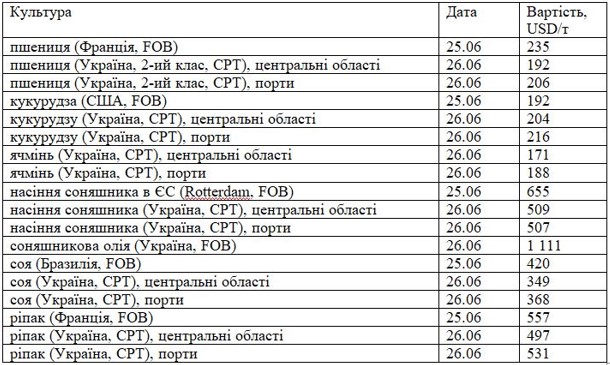
According to Oleksandr Serhiyovych Korenitsyn, the price of sunflower seeds in the EU (Rotterdam, FOB) as of June 25 was USD 655/t. The changes are as follows: +5 USD per week, -14 USD per month, and +170 USD per year. The price of sunflower seeds (Ukraine, CPT) on June 26 (central regions) was 509 USD/t. This is 8 USD less per week and 16 USD less per month, but 109 USD was added to the price per year. For ports, the cost is 507 USD/t. The price fell by 6 USD per week and rose by 9 USD per month and 148 USD per year. A ton of sunflower oil (Ukraine, FOB) costs 1,111 USD as of June 26.
The cost increased by $8 per week and by the same amount per month.
The calculation of price fluctuations for soybeans is based on its cost as of June 25 (Brazil, FOB) – $420/t. It decreased by $10 per week and by $16 per year, but increased by $15 per month.
“The price of soybeans (Ukraine, CPT) in the central regions was 349 USD/t on June 26, which is 8 USD less than a week ago, 4 USD less than a month ago, and 23 USD less than in 2024. The price for ports is 368 USD/t. It decreased by 14 USD, 13 USD, and 10 USD over the week, month, and year, respectively,” said analyst Alexander Korenitsyn.
The price of rapeseed (France, FOB) on June 25 was $557/t. Price changes: down $9 per week, up $7 per month, and up $55 per year. The cost of rapeseed (Ukraine, CPT) on June 26 for central regions is 497 USD/t (up 106 USD per year), for ports – 531 USD/t (up 110 USD per year).
agricultural sector, COST, DOLLAR, EXPORT, HARVEST, Oleksandr Korenitsyn, PORT, PRICE, SOYBEANS

Bosnian investment group ASA Group has announced the completion of its acquisition of the Zito Backa flour mill in Kula, Serbia. This was stated in the company’s official press release published on Friday.
According to ASA Group, the deal makes its subsidiary ASA Trading a leader in Serbia’s grain sector in terms of grain trading volume, storage capacity, and processing capacity.
“This is a logical continuation of our expansion strategy in key sectors of the region. Zito Backa has more than a century of tradition, reliable quality, and infrastructure that matches our international ambitions,” said ASA Group CEO Eldin Hadzislimovic.
The company emphasized that it is building on its previous experience in asset integration, including the purchase of the Zitoprodukt mill in Bačka Palanka in 2018. According to ASA Group representatives, the new acquisition will complement the ecosystem in the consumer goods segment and strengthen the group’s export potential in Southeast Europe.
In addition to the grain sector, the holding company is actively developing projects in other industries, including date and vegetable oil production in Morocco and Turkey, as well as renewable energy in Bosnia and Herzegovina (solar power plants in Bosanski Petrovac).
Zito Backa is one of Serbia’s oldest flour milling companies. It was founded over 100 years ago. In 2013, the plant in Kula was modernized: capacity was increased to 220 tons of flour per day (in wheat equivalent) and a 50,000-ton grain storage facility was built. The company is known for its high-quality flour and stable supplies to domestic and export markets.
https://t.me/relocationrs/1170

At one of the largest agricultural events in the country, the Agro Ukraine Summit in Kyiv, the AgriAcademy.org platform was presented, providing free access to professional education for farmers from all over Ukraine. The initiative was presented at three industry conferences during the summit and attracted considerable interest from industry associations, producers, and processors, according to SEEDS.
“Today’s agribusiness requires quick decisions, relevant practical knowledge, and continuous professional development. That is why I would like to draw your attention to one of the most promising initiatives in the field of professional education for agribusiness – AgriAcademy.org. This is a unique educational platform that brings together the agribusiness community of Ukraine and provides modern, practical knowledge in the form of free online courses developed by the best experts from Ukraine and around the world.
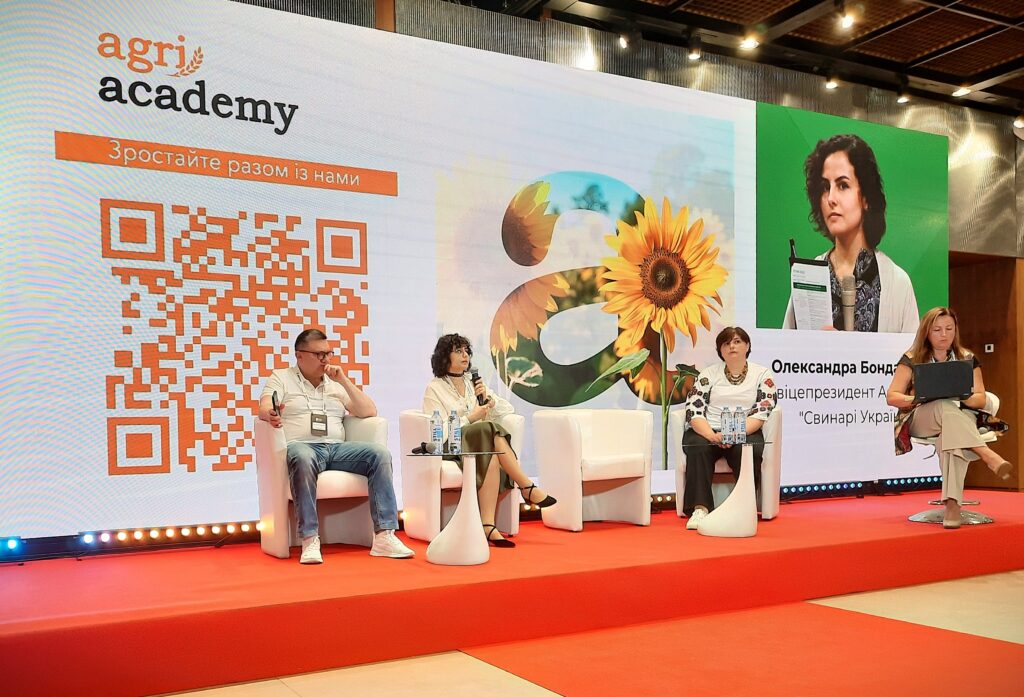
It is designed for professionals in the agricultural sector: business owners, managers, farmers, agronomists, veterinarians, and anyone interested in practical knowledge and increasing profitability,” emphasized Rodion Rybchynsky, Chairman of the Ukrainian Flour Millers Association and UN FAO grain market expert, during a panel discussion on “The transformation of grain processing in the context of European integration.”
“The platform already offers 23 free online courses in Ukrainian, developed with the support of the EBRD. Each course has been created in collaboration with leading Ukrainian and international experts, with a focus on practical benefits for business,” said Rodion Rybchynskyi.
AgriAcademy was also presented at the conferences ‘Futurology of Grain Storage’ and ‘Effective Livestock and Poultry Farming,’ which allowed it to reach a wide audience. Each conference was attended by 70 to 150 participants, and a QR code with direct access to AgriAcademy was displayed on the screen every 15 minutes in the Summit exhibition area.
Among the speakers who presented the platform was Oleksandra Bondarska, Vice President of the Ukrainian Pig Breeders Association.
“AgriAcademy offers over 300 hours of training. After completing the course, participants receive an official certificate. It is a tool for the real development of agricultural entrepreneurs,” said Oleksandra Bondarska, speaking to an audience of livestock and poultry farmers.

“The platform offers a course entitled African swine fever – everything a business needs to know. The course covers all aspects of African swine fever (ASF) that need to be known, from risk factors and main routes of transmission to effective prevention and response measures. Participants will learn how the disease develops on an infected farm (experience of affected enterprises), how to reduce risks for their farm, and protocols for action in case of suspicion and after the outbreak has been eliminated,” the expert added.
Oleksandra also advised producers to take the Basics of Pig Health course available on the platform. The course covers issues of animal health support and control throughout the entire production cycle in terms of technological and age groups of pigs and types of diseases, and also includes information on quarantine and the development of herd health monitoring and vaccination programs.
The AgriAcademy platform was also presented by Sviatoslav Tkachenko, member of the board of the Ukrainian Elevator Association, during the conference “Futurology of Grain Storage” to an audience of grain producers, processors, and exporters.
“AgriAcademy offers practical courses in agronomy, irrigation, processing, technology, berry growing, animal husbandry, crop production, veterinary medicine, and ecology:https://agriacademy.org/courses-catalog/
This spring, two courses from specialists at the Astarta-Kyiv agro-industrial holding have been added: Sunflower. Growing Technology and Sunflower. Biological Characteristics of the Crop,” said Sviatoslav Tkachenko.
You can join the free training now at AgriAcademy.org
The courses are designed with the practical needs of the industry in mind and are taught in Ukrainian, ensuring convenience, accessibility, and high learning efficiency. Grow your business with AgriAcademy, your reliable partner in innovation and efficiency improvement!
Source: https://www.seeds.org.ua/
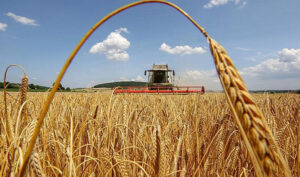
The Ministry of Agrarian Policy and Food and the World Bank plan to expand cooperation in the development of Ukraine’s agribusiness sector.
The agreement was reached following talks between Minister of Agrarian Policy and Food Vitaliy Koval and World Bank Managing Director for Operations Anna Bjerde, the ministry’s press service reported.
According to the report, the parties agreed to expand cooperation in three areas: preparing analytical data for decision-making in the agribusiness sector; institutional support for the Ministry of Agrarian Policy with a focus on integration into EU policies and standards; implementation of programs for more than 200,000 small and medium-sized farmers as the basis for Ukraine’s agricultural sustainability.
“Our goal is not only to preserve but also to transform Ukrainian agriculture in line with EU standards and opportunities. And the advocacy platform provided today by the World Bank team in Vienna is actually the key to faster and more successful European integration,” Koval emphasized.
In addition, during the meeting with World Bank representatives led by Regional Director for Sustainable Development in Europe and Central Asia Sameh Wahba, the possibility of deepening cooperation in the field of irrigation was discussed. In particular, they talked about restarting the irrigation system development plan to get help in more regions of Ukraine.
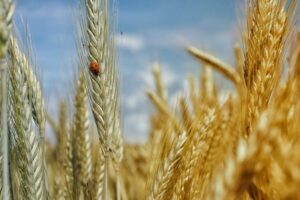
Companies from the United Arab Emirates (UAE) are ready to invest in the production of processed foods, grain transshipment and port development, the Ministry of Agrarian Policy and Food has reported.
According to the ministry, during a working visit to Saudi Arabia, Minister of Agrarian Policy and Food Vitaliy Koval and a government delegation headed by First Deputy Prime Minister and Minister of Economy Yulia Svyrydenko met with more than 20 leading UAE companies. Among them are port operators, investment, agricultural and trading companies interested in import and export cooperation with Ukraine.
“Ukraine and the United Arab Emirates have opened a new page in economic partnership. Among the UAE companies there are those that are ready to enter the Ukrainian market. In particular, to invest in the production of processed products, such as oilseeds, rapeseed, soybeans. As well as grain transshipment and port infrastructure development,” Koval said.
The Minister emphasized that the Ukrainian agricultural sector is already actively working with the UAE. In 2024, we exported more than $197 million worth of agricultural products. Among the most popular products were fats and oils of animal or vegetable origin, meat and edible offal, cereals, vinegar, etc.
As reported, the Comprehensive Economic Partnership Agreement between Ukraine and the UAE was signed in Abu Dhabi on February 17. It provides for free trade between the two countries and liberalization of access to the UAE market for Ukrainian agricultural products, including duty-free supplies of beef, lamb, dairy and processed foods. In addition, the Saudi side has expressed interest in joint development of beef cattle breeding and production of organic products.